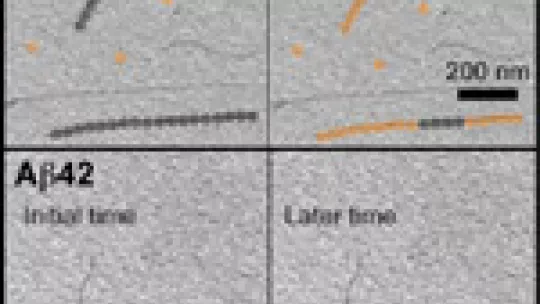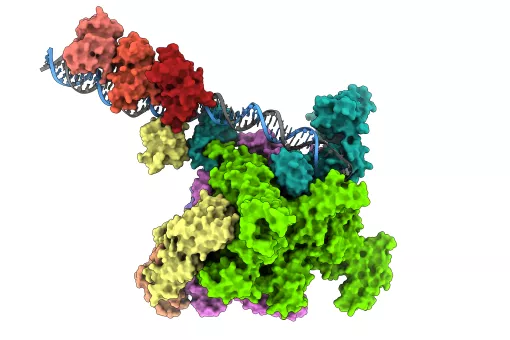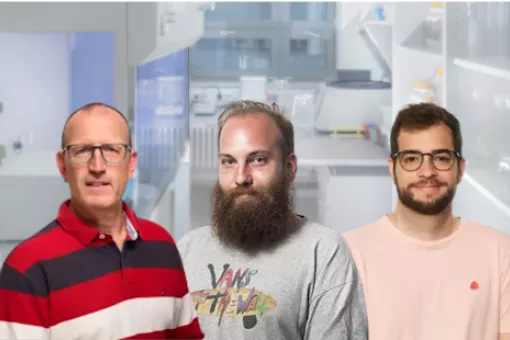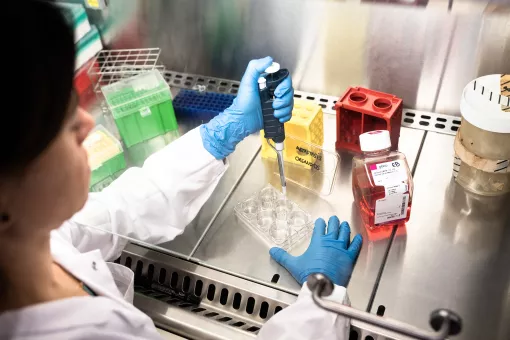Images
The discovery provides intriguing new clues as to the cause of the disease and may lead to the development of novel therapeutic strategies.
A research study, published yesterday (Tuesday, 12 April 2011) in the Journal of the American Chemical Society (JACS), demonstrates that the aggregation of amyloid-beta (Aβ) proteins into amyloid fibrils characteristic of Alzheimer’s disease (AD) is not irreversible, as previously thought. The Aβ protein molecules that comprise the fibrils are continuously detaching from and re-attaching to the fibrils, resulting in molecular recycling. These findings suggest that recycling could be a source of small non-fibrillar Aβ aggregates, which are believed to be responsible for the neurodegeneration observed in AD. The authors of this study, experts in protein structure and aggregation at IRB Barcelona and other research centers, led by the ICREA researcher Nàtalia Carulla, believe that modulation of fibril recycling may lead to the development of new therapeutic approaches to treat this disease.
New insights into the dynamics of amyloid fibrils
AD is a progressive neurodegenerative disease characterized by the presence of amyloid plaques in the brain. Previous analysis of these plaques revealed that their main constituents are fibrillar aggregates of the Aβ protein known as amyloid fibrils. This is the reason why initial studies proposed that Aβ fibrils caused the disease. Later, it was observed that there were only weak correlations between levels of amyloid fibrils in the brain and the severity of dementia. This finding led to the formulation of new hypotheses in which small Aβ protein aggregates formed before the development of fibrils are thought to be responsible for neurodegeneration. Recent data have shown that fibrillar plaques are a potential reservoir of small toxic Aβ protein aggregates. In this scenario, “understanding the molecular basis of the disease requires knowledge about the interconversion between the different species present during Aβ protein aggregation”, says Carulla.
The team of researchers at IRB Barcelona has now characterized molecular recycling of two Aβ proteins, Aβ40 and Aβ42, the latter being the most associated with AD. After monitoring recycling during 40 days using hydrogen/deuterium exchange experiments, they found that Aβ40 and Aβ42 molecules recycle within the fibril population, although to different extents: after 40 days, 80 % of the molecules making up Aβ40 fibrils underwent recycling while only 30 % did so in Aβ42 fibrils. These observations imply that Aβ42 recycles more slowly.
“In the context of AD, demonstrating that recycling occurs in the fibrils is a step forward but it is also crucial to identify the recycling species involved; whether they are individual Aβ units or small aggregates made of several units”, explains Carulla. “It will be important to address if differences in the recycling species within Aβ40 and Aβ42 fibrils are relevant in the development of Alzheimer’s disease. We are now working towards this aim”, emphasized Carulla. “Once we have this information, we will be in a position to devise new therapeutic strategies that can modulate recycling”.
Reference article:
Aβ40 and Aβ42 amyloid fibrils exhibit distinct molecular recycling properties.
Sánchez L, Madurga S, Pukala T, Vilaseca M, López-Iglesias C, Robinson C V, Giralt E and Carulla N.
JACS (2011) [doi: 10.1021/ja1117123]
About IRB Barcelona
The Institute for Research in Biomedicine (IRB Barcelona) pursues a society free of disease. To this end, it conducts multidisciplinary research of excellence to cure cancer and other diseases linked to ageing. It establishes technology transfer agreements with the pharmaceutical industry and major hospitals to bring research results closer to society, and organises a range of science outreach activities to engage the public in an open dialogue. IRB Barcelona is an international centre that hosts 400 researchers and more than 30 nationalities. Recognised as a Severo Ochoa Centre of Excellence since 2011, IRB Barcelona is a CERCA centre and member of the Barcelona Institute of Science and Technology (BIST).





